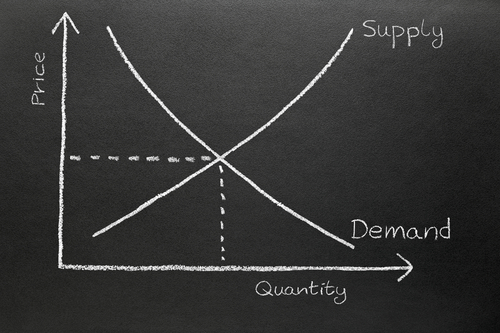

In “The Greatest Service Economists Perform,” published this morning by the American Institute for Economic Research, Don Boudreaux tells a story that he had told me in shorter form many years ago. It’s one of my favorite stories about someone being “hooked on economics,” to the use the title of Chapter 2 of my book The Joy of Freedom: An Economist’s Odyssey. Here’s Don’s story:
My love affair with economics began nearly 42 years ago in a classroom at Nicholls State University (in Thibodaux, Louisiana). I was an 18-year-old freshman with only four passions: girls, football, beer, and The Beatles. But this reality soon changed dramatically.
The winter of 1976–77 was bitterly cold. That January, my hometown of New Orleans had a few low temperatures in the teens, and snow fell as far south as Miami! One dark, bone-chilling January morning as I made the 50-mile drive to school I heard on the radio that an elderly couple in Buffalo had frozen to death in their home. They had no heat because of the nationwide shortage of natural gas.
For the spring 1977 semester, I enrolled in Michelle Francois’s economics course because it didn’t meet on Tuesdays and Thursdays. On those days of the week I worked at the shipyard where I assumed I would soon begin working full-time once I’d satisfied my mother’s unreasonable demand that I attend college for at least one year. When I signed up for Dr. Francois’s course, I hadn’t the slightest idea what economics was, nor did I care. I had a steady girlfriend, enough money to buy a regular supply of Budweiser, and a collection of all Beatles’ records. Life was fine.
But one day early in the semester Dr. Francois drew a supply-and-demand graph on the blackboard. “Look at what happens when government imposes a price ceiling.” She pointed to the graph. “The quantity demanded exceeds the quantity supplied. There’s a shortage.” Facing her students, Dr. Francois continued: “You all remember the gasoline shortage of 1973. Here’s the explanation. The government now has price ceilings in place in the energy market, keeping gasoline and natural gas in short supply.”
Wow! Just wow! I remember sitting up straighter at my desk to gaze in fascination at that supply-and-demand graph. For the first time in my life, I experienced the thrill of intellectual discovery. Here was a compelling explanation of why that couple in Buffalo froze to death. Here also was a compelling explanation of why, when I first got my driver’s license in 1973, there was a nationwide shortage of gasoline, complete with such long lines at service stations that I didn’t do much driving.
Not only did Dr. Francois’s course convince me to finish college, it inspired me to dream of getting a Ph.D. in economics. Economics is powerful stuff!
If you don’t count the lines to draw the axes, it takes only three lines—the demand curve, supply curve, and price ceiling—to show the result. I think I remember Don telling me that those are the most important three lines in economics. I’m not sure I agree, but they’re definitely up there.

READER COMMENTS
Don Boudreaux
Sep 17 2018 at 12:27pm
Many thanks, David, for sharing here this story of mine. It is indeed one of my favorites, both to reflect upon and to recount.
Those three lines might well not be the most important three lines in economics, but I believe that two of those three lines – the supply curve and, even more foundationanally, the demand curve – are the two most important lines in economics!
David R. Henderson
Sep 17 2018 at 4:12pm
I’m with you on S and D.
Alan Goldhammer
Sep 17 2018 at 4:19pm
As a non-economist I thought the Laffer Curve was the most important line in econ.
robc
Sep 19 2018 at 11:16am
The Laffer Curve is just an economist renaming Rolle’s Theorem.
https://xkcd.com/2042/
David Henderson
Sep 19 2018 at 12:59pm
While I don’t agree that the Laffer Curve is the most important line in economics, and I agree with you that Laffer’s curve is an application of Rolle’s Theorem, I think the word “just” to describe his contribution is inapt. The reason is that before Art Laffer drew his curve and starting talking about it, economists didn’t talk much about the effect of high marginal tax rates on the tax base. He got them (including me at the time) talking about it and taking it much more seriously.
David Seltzer
Sep 17 2018 at 5:20pm
Those two lines yield the price mechanism and resources are allocated accordingly. Friedman counseled, price transmits information. Because energy prices were fixed, there was no incentive for new suppliers to enter the market. Hence a shortage.
Richard Ober Hammer
Sep 17 2018 at 5:36pm
Those three lines also shocked me, in the fall of 1974 when I was taking the core economics class for Carnegie-Mellon’s MBA students. I was depressed for days. Having been raised in a leftist family, I was leftist. I had assumed that government could just make things better if it would only give the right instructions. And the reason why government was not giving the right instructions was because politicians were bad or stupid. I could step in to the rescue!
But those three lines made me see that government can’t do some things. I hated it. But the logic was undeniable. My reading took on a libertarian direction.
Gottfried Leibniz
Sep 19 2018 at 6:34pm
I have the exact same story regarding upbringing, except that I was born in 1980 and my aha moment was more of an aha half-decade becoming a self-taught econ-nerd due to the necessity of managing the economic fruits of a young career.
Comments are closed.